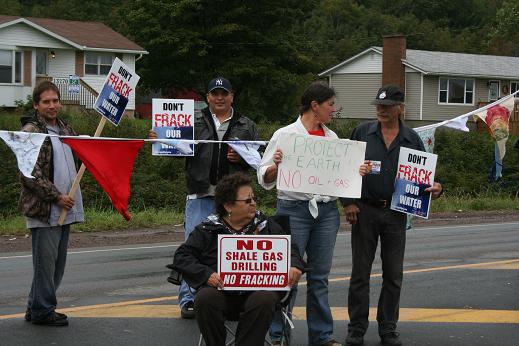This weekend, hundreds of people driving to and from Cape Breton, Nova Scotia, were greeted by a large gathering as part of ‘Global Frackdown‘ — a worldwide day of action and solidarity, intended to “send a message to elected officials in our communities and across the globe that we want a future fuelled by clean, renewable energy, not dirty, polluting fossil fuels.”
The fight to protect Lake Ainslie, Nova Scotia’s largest freshwater lake, has brought together local First Nations, social justice and environmental groups, and concerned individuals. The event was organized by the Waycobah First Nation, and was a follow-up to similar events in the past two weeks as Petroworth looks to move ahead with their plans for an exploratory well on the shores of West Lake Ainslie.

Decked out in vibrant rain gear, participants chatted to drivers and with each other alongside the highway, handing out Council buttons and stickers, sharing food and making friends. Children held “I heart Lake Ainslie” posters, while another activist from the Occupy movement ran alongside passing vehicles, applying ‘Don’t frack our water’ stickers for those in support.

Despite being slowed down on the highway due to the event, drivers displayed an overwhelmingly positive response, highlighting the widespread support for a ban on fracking in the region. Passerbys, including truck drivers, families, and police officers, showed their support with honks, waves, fists of solidarity and lots of smiles. The event showcased a strong sense of community and support for this grassroots movement.
Along with a few other speakers, Wilbert Marshall, chief of Chapel Island First Nation, spoke to an appreciative group to demonstrate the commitment of Mi’kmaq leadership in Nova Scotia. After the rally, organizers invited the whole group to join in their water ceremony, led by members of the Wacobah but who also invited Rebecca Parkins, whose home is next to the proposed drill site, to stand with them. The moment was blessed by a sighting of three eagles soaring above the strait, who have great spiritual significance in the Mi’kmaq culture.

This was also shown by who was there. Carloads of people came from Halifax, the North Shore of Nova Scotia, and Inverness County. Among the great show of solidarity were several Council of Canadians members, including myself, Ali Vervaeke (Atlantic Organizing Assistant), Anne Levesque (Atlantic Chapter Representative to the Board), Berta and Brian Gaulke of the North Shore chapter, and several people from the Inverness County chapter (about 15). We all shared a common goal to protect our water and land from shale gas development and fracking.
What’s Harper up to? Award-winning journalist Karl Nerenberg keeps you in the know. Donate to support his efforts today.



